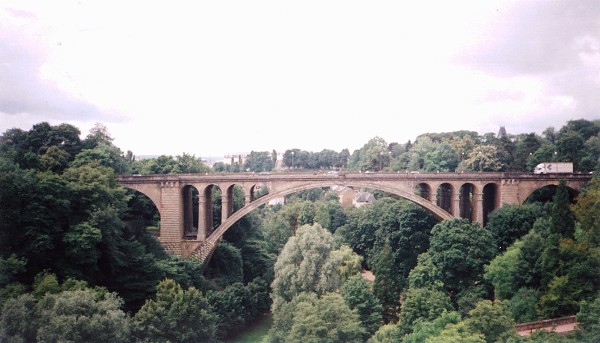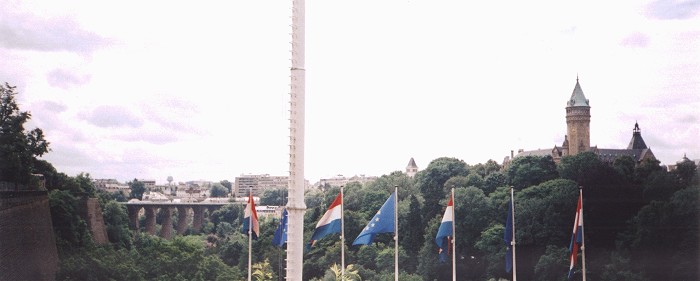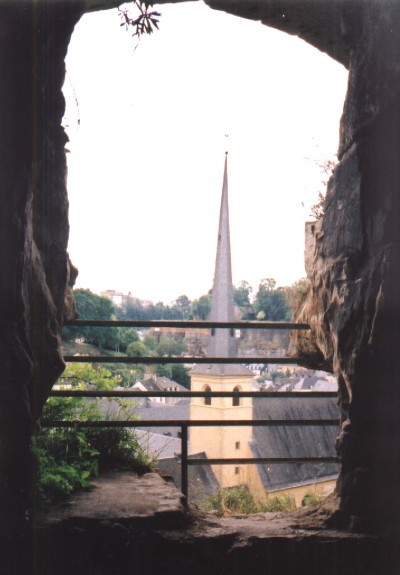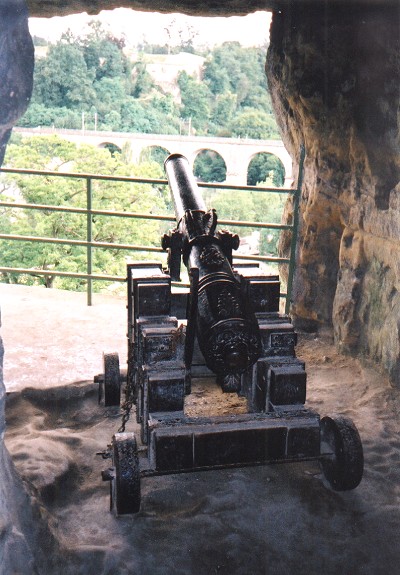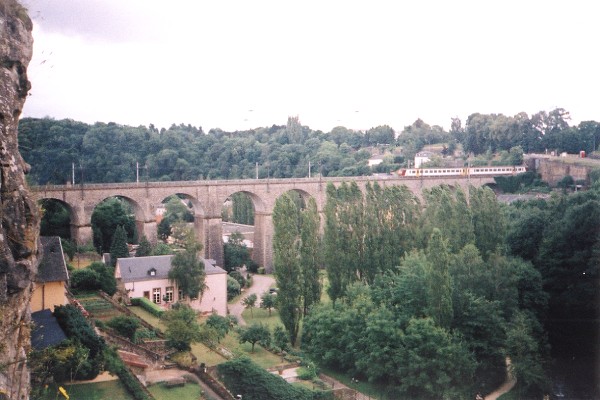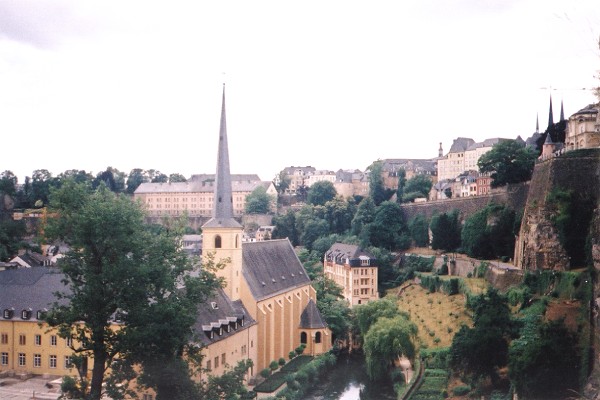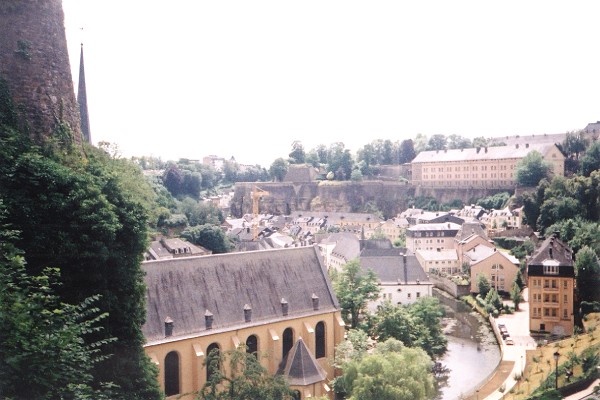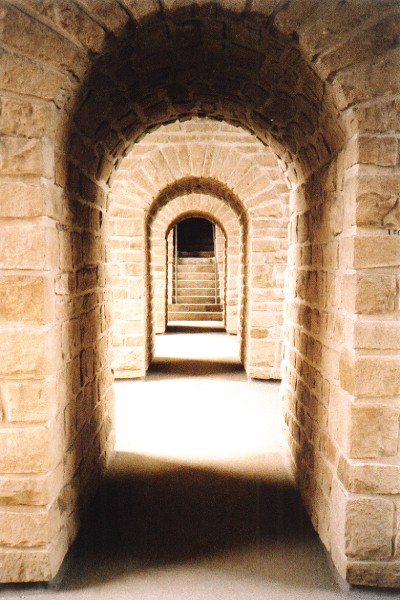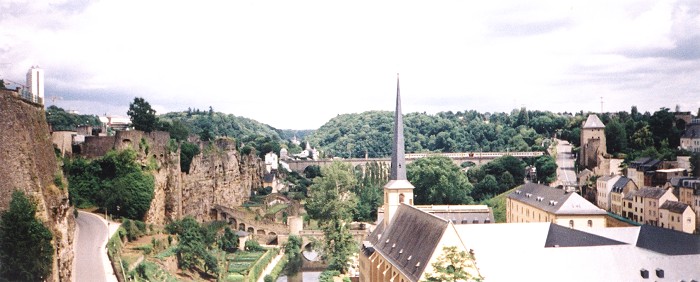|
There was time to spare as I took a lazy walk back to the station. What I had seen of Luxembourg was nothing quite like I had imagined beforehand. Although expensive, it was a unique and attractive little place, and another of the many quirky misfits which made up the varied landscape of Europe. I had only done the bog-standard tourist circuit, however, and there was much more to see in the rural districts and small towns around the country. My train journey on a branch line through the north of Luxembourg offered some more scenes of the lush countryside. The railway wound around valleys and through the southern hills of the Ardennes which stretched further up into Belgium, and dark threatening clouds marauded across the land spilling torrents onto the dense green forests. There were some perfect rambling and cycling opportunities in this region, though they would be best performed another day in a friendlier climate. Thunder storms rumbled all around but there was little electrical activity, just angry clouds having an audible fight. The weather was dismal but the gloom was satisfying. Too much sun had become a bore, and I had experienced virtually nothing but clear skies and intense heat until now. Forecasts predicted that the moody conditions were set to accompany me for the remainder of my trip, but I didn't really mind. They would provide some contrast and prepare me for anything similar which would typically await on return to England. They also prepared me for the entrance to Liège; a slightly grim, industrial sprawl that looked set to offer little if I stayed there. According to my beliefs about tarted up towns and their lack of fizz I should perhaps have given Liège a chance, but a flick through my timetables showed regular services departing for the nearby town of Maastricht, further east and across the border into the Netherlands. With the evening only just underway, it seemed worth a gamble to try and reach the hostel there instead. Several people had suggested Maastricht as a worthy destination, and I was determined to take in a small part of Holland in addition to at least one night in Belgium. I would also thereby have an opportunity to visit another little place of wonderment - the funny drippy bit which stemmed down from the southern regions of Holland. Liège - Maastricht My fascination with maps had me staring many a time at this dangly Dutch district, and so it was necessary to go there and satisfy my craving for discovering probably nothing in particular. I had hoped to make it to Amsterdam and take in a few Dutch cities towards the end of my travels, but there was no longer time for that to be a realistic plan. Maastricht was only a quick hop across the border, and the train from Liège was packed with literal cross-country commuters. My immediate impressions of the place when we arrived weren't all that striking. It was a grey day which didn't help to illuminate the rather bleak looking station. I followed the town maps to find a central point from where to board a bus to the hostel. On the way I stopped at a greasy diner by the main square for a cheap dinner, which had to be gulped down so that the proprietor could lock up her shop. It wasn't a very satisfying meal. It could be guaranteed that the Dutch would always rival the British when it came to unhealthy fast food snacks. In many such ways, Holland was the most similar country to Britain of those I'd visited, but the countries were worlds apart in other elements of their culture and society. The bus stop wasn't far away, but when I got there it seemed that I was out of luck. All the buses serving the youth hostel on the outskirts of the town stopped running in the early evening, and there didn't appear to be any others which travelled anywhere near it. Facing a pricey taxi ride or a very long walk, I paced the bus shelter for a while hoping that a miracle might occur. I was in luck. The miracle that occurred came in the form of a very friendly Dutch couple. Of all the people queueing in the shelter, I struck gold with the lady I asked for assistance in English. She and her husband were from Amsterdam, but frequently travelled to Maastricht and were familiar with the town. When I enquired about the lack of bus services they knew instantly that I must be heading for the hostel, which they had also stayed at before. Very kindly, they offered to give me a lift, but we first had to take a bus to where their car was parked. With a long strip of bus tickets in his hand, the man assured me it was not necessary that I pay for my fare, and having spent twenty minutes fretting in the piddling rain about what state my terrible trainers might be in after a four-mile trek, I sat relieved and contented on the bus as we pulled away and left plenty of sad, sodden faces standing at the stop. A couple of miles later we got in the car, and the couple were unbelievably helpful in depositing me at the door of the hostel, which lay in a field a fair distance from anywhere. I doubted that I would ever have found it had I walked without a map. Having never spent time travelling in the same manner in my own country, I couldn't verify whether the Brits would have been so generous, but I couldn't imagine that most people would be so warm and kind-spirited as to offer a lift to somebody they had met only seconds earlier in a bus stop. What was certainly evident, however, was that being a traveller in foreign lands, struggling to speak in other languages and being lost in search of information, frequently brought about meetings and opportunities which never occurred in normal life at home. It was one of the things that I loved about travelling, and a motivation to do lots more of it. Despite the difficulties with making bookings and arrangements, trying tricky translations and having to be a permanent enquirer as to where, what and how in strange territories, travelling was more often than not fun. Life was constantly being refreshed with new people, new places and new experiences, and seldom did so many doors unexpectedly open up for me when settled in any one place for too long. With just three days of travel remaining, I had to start thinking hard about how I could prepare for some more. The youth hostel out in the sticks of Dousberg was something of an oddball in comparison with the many others I had visited; a sort of swimming, sports, fitness and leisure centre-cum-tennis club-cum-hotel-cum-hostel. That was the bit I couldn't get my head around. I was in a hotel, yet for a lower rate I could take a shared dormitory in the same complex and they would call it a hostel. Accordingly, all that the rich had to gain was a dropped 's' and a room to themselves. I was a bit puzzled, and taken aback by the enormous price of 24 Euros - the highest tariff I'd faced, but the place seemed clean and spacious, and I had little choice. Most importantly, it had a bar. That was all I really needed to know. I found my room divided in two with eight bunk beds on my side, most of which were empty, as was the whole hostel. It was always a little disappointing to end a long day's travelling and arrive at some promising accommodation with a bar, only to find nobody in it to share a drink with. Later, an American guy returned to the dormitory and slumped out in his bed opposite. We had a chat for a while, and it was clear that his main reasoning for travelling in Holland was the country's lenient attitude towards certain substances. He'd spent a very relaxed time in Maastricht's finest coffee shops and was looking forward to more of the same tomorrow, and the next day, and probably the day and week after that too. He couldn't abide living in his own country anymore, and was not at all happy contemplating his forthcoming return there. We had an interesting and sometimes quite deep, philosophical chat about things, but I had to let him sleep and ensure I salvaged at least one drink from the bar before it closed. Happily, when I returned to the dormitory, everybody was sound asleep, or rather, no sound asleep. Not a single wheeze, grunt or snore - the people here were too chilled out to make noise in the day let alone at night. It had been a low-key evening, but I was overjoyed at the prospect of an undisturbed night's sleep in a comfy bed. HOSTEL REPORT: Maastricht - NJHC
Hostel de Dousberg, Dousbergweg 4, 6216 GC Maastricht |
